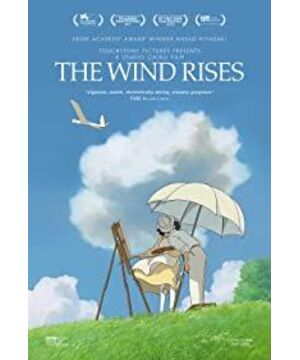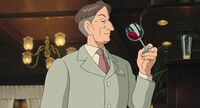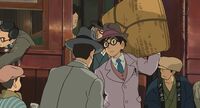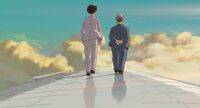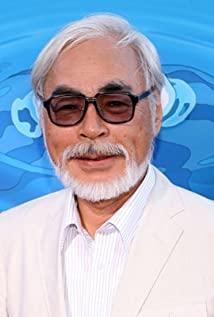Some students on the BILI station said that they did not understand what Miyazaki wanted to express, and many people watched the film with conflicts. The contradiction itself is probably one of the elements that Miyazaki wants to express. Before the film was produced, he also repeatedly considered whether this subject matter would have a bad effect. After the film was released, he specially made an anti-war topic in the internal magazine "Hot Wind" to express his position. But just as Japanese netizens said, the attitude that Hayao Miyazaki expressed and the things he promoted in the film are actually contradictory, and his own interpretation of the position is also untenable.
The content of this film is actually very simple. As he himself said in an interview, he wanted to "describe the story of a young man who is loyal to his dreams, has no distractions, and keeps making progress." But at the same time, "dreams sometimes also It’s crazy. This negative impact must also be expressed in the film." Some people questioned that the work did not reflect enough on the war, but Miyazaki himself did not shoot this film from an anti-war stand. He wanted to do it. It is the story of a teenager chasing his dream. But the problem is that everyone lives in an era, and everyone’s actions are part of the era. It is impossible not to be affected by the era. Conversely, it is impossible not to affect the era. Putting aside the era, what simple Enthusiasm and ideals, even if they are not evasive, have a taste of nihilism to a certain extent. Therefore, this work is lacking in ideology.
I don't want to criticize Miyazaki. I still like this old man. I also believe that his anti-war mood is true. But from the result, it will undoubtedly be misleading. I can only say that it is a lack of understanding. Miyazaki’s problem is not actually the contradiction between peace enthusiasts and weapons enthusiasts, but the inability to establish a more complete vision and resolve this contradiction ethically. Miyazaki must have realized his contradiction somewhat. He finally found an explanation that separates ethics from behavior. He believes that as a technician, Jiro Horikoshi is only pursuing the dream of flying, and the dream itself is not at fault. He said: "Those fans who talk about zero war all day are mostly stubborn complexes and extremely vanity. A heavy person. I don’t want to see the extremely talented results created by a genius like Horikoshi Jiro, who transcends thinking and technical ability, to become a vent for patriotism and national complexes. I want to use this movie to put Jiro Horikoshi on Take it back from this type of person." There is no doubt that his starting point is good, and it seems to have solved the surface ethical contradictions, but if you look at it seriously, it is still impossible to make sense.
Regardless of specific settings such as airplanes and weapons, what Miyazaki admires is actually a typical craftsman spirit. The so-called craftsman spirit is the spiritual concept of focusing only on the product itself, pursuing perfection and the ultimate, and striving for perfection. From another perspective, it is the nihilistic attitude of not asking about the world. Art Supremacy has the same problem. Japan seems to be particularly rich in talents of this type. It is hard to see the goal, and never think about the past and the future. This pure effort created the miracle of Japan's Meiji Restoration and the two post-war national strength soaring, but on the other hand, the lack of an overall ethical perspective also planted the roots.
In the German war reflections after World War II, Hannah Arendt put forward the viewpoint of "banal evil" and pointed out the collective responsibility of the Germans to the war in World War II. Many Germans worked diligently, honestly and reliably in daily life. Politics is just doing one's own duty, but their dedicated work is actually part of the huge war machine. After the war, many Germans evaded that they didn’t know about the Holocaust and put the blame on a small number of Nazis, but they actually knew and should know that they just closed the loop of their own thinking and judgment, and thus escaped. Own responsibility. Arendt pointed out that “the lack of speculative introspection and the resulting non-judgment is one of the reasons why individuals and collectives commit political crimes”.
There is no doubt that the craftsman spirit in Horikoshi Jiro also carries this mediocre evil color. In the film, the protagonist and his friends have also repeatedly stated that they actually understand the conditions and costs of the war. For example, Honjo said that the money for building an airplane would be enough for many poor people to feed and wear for a few years, but they believed that this was the price. Still have to build airplanes. Another example is that during the war, two people calmly discussed that Japan would lose in war with many countries, but they believed that they only needed to build a good plane. I don't think this is an excuse. The real Horikoshi Jiro in history also made it clear: "Many people say that I am also responsible for the war, but I don't think I am responsible." But I think that this kind of clear conscience is actually just self-deception. Similarly, Hayao Miyazaki explained in the interview, “As a member of the Japanese nationals, Jiro Horikoshi does bear the responsibility of the war. However, it is not necessary for a technician to shoulder the responsibility of the entire history. I think he should be blamed. Responsibility is worthless.” This kind of excuse for thinking that accountability is worthless, undoubtedly reflects the lack of understanding of many Japanese in reflecting on war responsibilities.
Jiro Horikoshi also raised his opposition to the war in World War II, but the reason was that he was far from the United States and other countries in strength, and he had no chance of winning. As a Chinese, the first reaction after hearing this idea must be that the position is not correct enough. Can you fight if you win? Leaving this aside, Horikoshi Jiro's reflection on the war is undoubtedly very limited, because he is always only a technician in the rear. Sima Ryotaro, who had been conscripted into an armored division, had a more real experience. Facing an enemy whose speed and quality were far better than his own, he couldn't help feeling deeply angry for the military and politicians who sent his young men to death. , He spent the rest of his life exploring why Japan fell into such a stupid war. It can be said that all of Sima Ryotaro’s novels are his reflections on war, and he also explored the craftsmanship that the Japanese are proud of. He believes that in a sense, it is this kind of craftsmanship that does not ask direction to introduce Japan into Japan. The abyss of war. The irony is that many of Sima Ryotaro's novels are often regarded as inspirational models in Japan. Readers only love to read his Meiji struggle spirit, but fail to see his self-deprecation and reflection. However, this is where Sima Ryotaro as a novelist is better than Hayao Miyazaki as an animation director.
Even if it does not involve war responsibility, technocracy cannot be used as an explanation of scientific ethics, let alone regarded as a model of scientific ideals. People who are truly highly accomplished in science and technology must also have deep humanistic care. Einstein is a good example. But the artisan spirit to tout nihilism is the favorite thing of our time. To be precise, this banality of evil is not just a problem for the Japanese, but is common in most people in industrial society. Disorderly production in business, knowing that it is wasteful, but blindly pursuing performance growth; indifferent and blind obedience to social affairs, blindly emphasizing abiding by the law, and not asking whether the law and the public are reasonable, and thinking that oneself is a small person can't afford anything The role and responsibility are placed on others, leading to the collapse of society and the environment step by step. In this sense, reflecting on war is definitely not a matter of one or two countries, but should be a common introspection of all mankind. Because the so-called war is just a continuation of daily life.
Once again, I did not want to criticize the old man Gong Zishu as a target. In fact, he proposed anti-war and critical revision of the constitution in "Hot Wind", which is already a very admirable act of courage. It's just a small dissent.
View more about The Wind Rises reviews


